Person-Centred Care, Ethical Issues & Healthcare Legislation
VerifiedAdded on 2023/06/15
|7
|1402
|270
Report
AI Summary
This report provides a detailed analysis of person-centred care in healthcare, contrasting it with traditional care delivery models and emphasizing the importance of equality and diversity in service provision. It highlights essential personal attributes for healthcare providers, such as empathy, and explores ethical considerations, including autonomy, truthfulness, equality, and fairness, particularly in the context of dementia care. The report also discusses two key pieces of legislation, the Health and Social Care Act 2012 and the Equality Act 2010, outlining the roles of agencies like the Care Quality Commission and the Department of Health in ensuring safe and effective care. The document concludes by referencing relevant books and journals that support the arguments and findings presented.
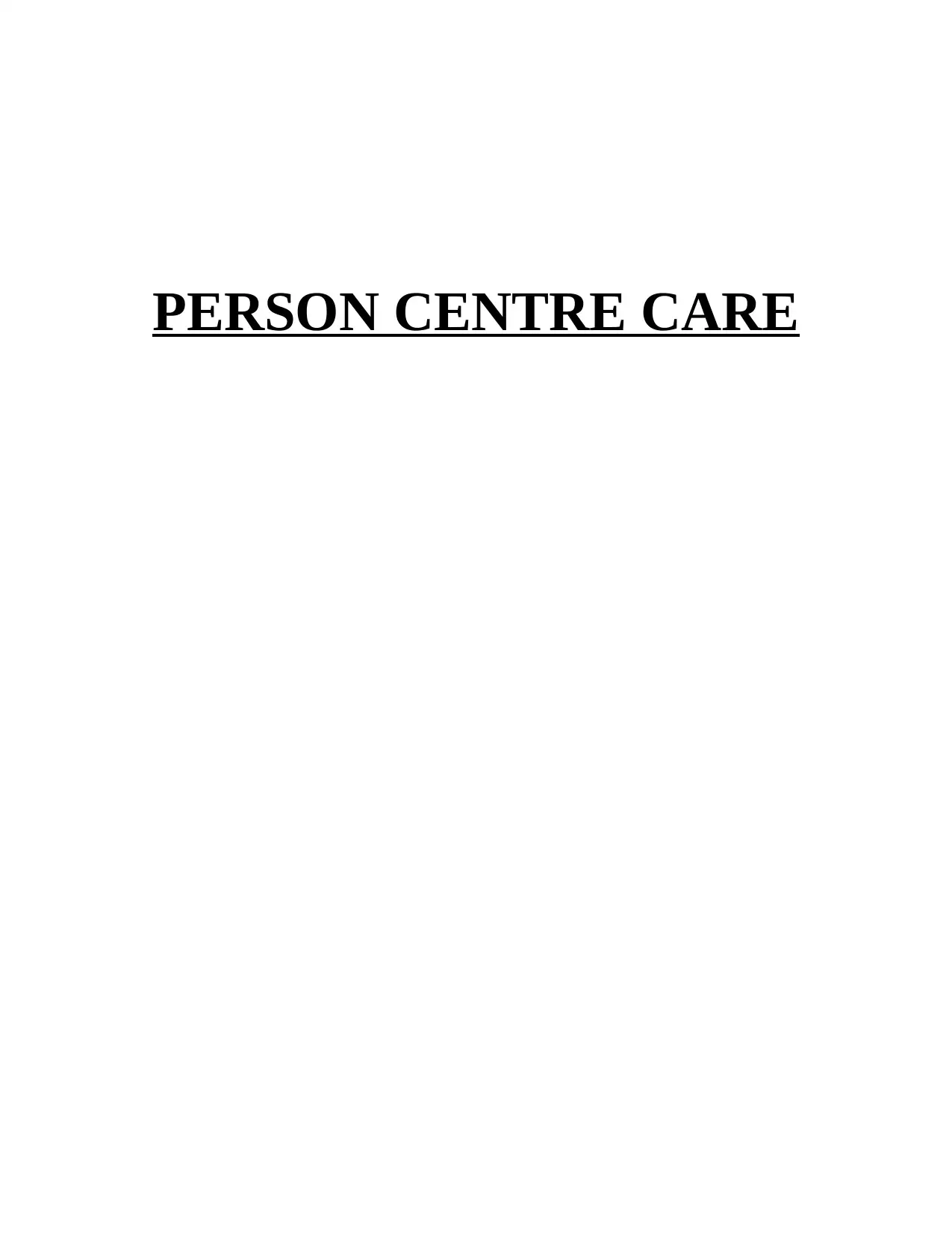
PERSON CENTRE CARE
Paraphrase This Document
Need a fresh take? Get an instant paraphrase of this document with our AI Paraphraser
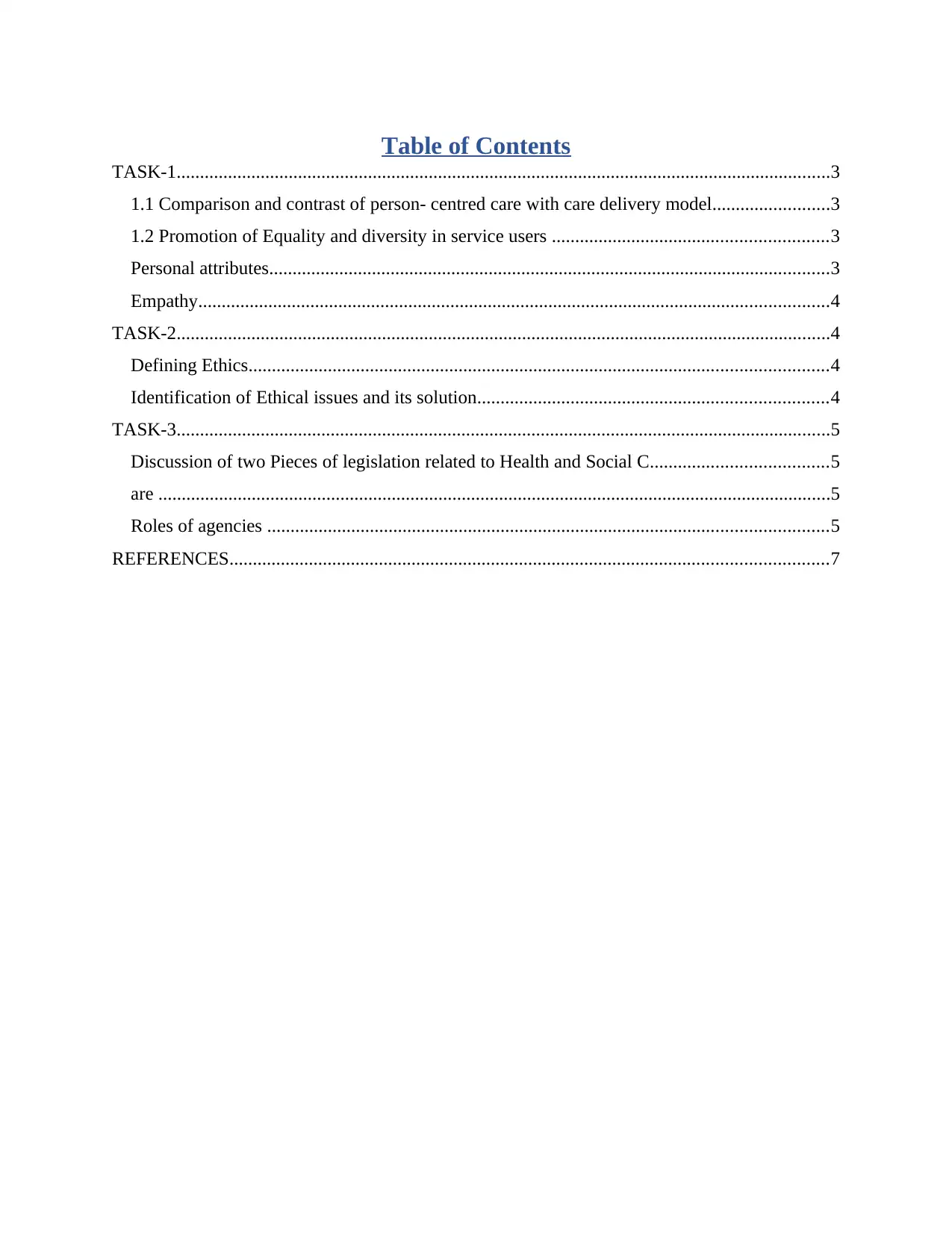
Table of Contents
TASK-1............................................................................................................................................3
1.1 Comparison and contrast of person- centred care with care delivery model.........................3
1.2 Promotion of Equality and diversity in service users ...........................................................3
Personal attributes........................................................................................................................3
Empathy.......................................................................................................................................4
TASK-2............................................................................................................................................4
Defining Ethics............................................................................................................................4
Identification of Ethical issues and its solution...........................................................................4
TASK-3............................................................................................................................................5
Discussion of two Pieces of legislation related to Health and Social C......................................5
are ................................................................................................................................................5
Roles of agencies ........................................................................................................................5
REFERENCES................................................................................................................................7
TASK-1............................................................................................................................................3
1.1 Comparison and contrast of person- centred care with care delivery model.........................3
1.2 Promotion of Equality and diversity in service users ...........................................................3
Personal attributes........................................................................................................................3
Empathy.......................................................................................................................................4
TASK-2............................................................................................................................................4
Defining Ethics............................................................................................................................4
Identification of Ethical issues and its solution...........................................................................4
TASK-3............................................................................................................................................5
Discussion of two Pieces of legislation related to Health and Social C......................................5
are ................................................................................................................................................5
Roles of agencies ........................................................................................................................5
REFERENCES................................................................................................................................7
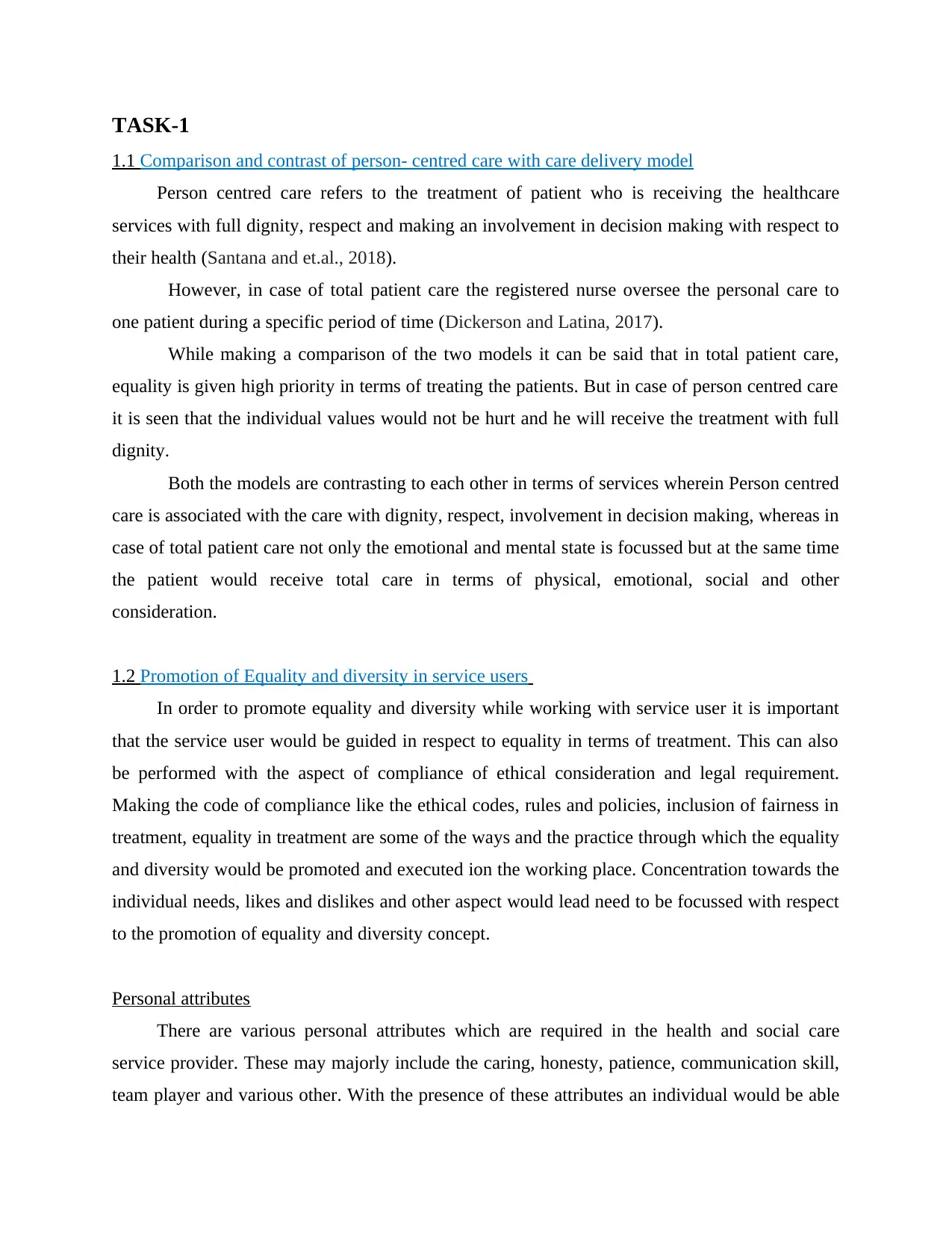
TASK-1
1.1 Comparison and contrast of person- centred care with care delivery model
Person centred care refers to the treatment of patient who is receiving the healthcare
services with full dignity, respect and making an involvement in decision making with respect to
their health (Santana and et.al., 2018).
However, in case of total patient care the registered nurse oversee the personal care to
one patient during a specific period of time (Dickerson and Latina, 2017).
While making a comparison of the two models it can be said that in total patient care,
equality is given high priority in terms of treating the patients. But in case of person centred care
it is seen that the individual values would not be hurt and he will receive the treatment with full
dignity.
Both the models are contrasting to each other in terms of services wherein Person centred
care is associated with the care with dignity, respect, involvement in decision making, whereas in
case of total patient care not only the emotional and mental state is focussed but at the same time
the patient would receive total care in terms of physical, emotional, social and other
consideration.
1.2 Promotion of Equality and diversity in service users
In order to promote equality and diversity while working with service user it is important
that the service user would be guided in respect to equality in terms of treatment. This can also
be performed with the aspect of compliance of ethical consideration and legal requirement.
Making the code of compliance like the ethical codes, rules and policies, inclusion of fairness in
treatment, equality in treatment are some of the ways and the practice through which the equality
and diversity would be promoted and executed ion the working place. Concentration towards the
individual needs, likes and dislikes and other aspect would lead need to be focussed with respect
to the promotion of equality and diversity concept.
Personal attributes
There are various personal attributes which are required in the health and social care
service provider. These may majorly include the caring, honesty, patience, communication skill,
team player and various other. With the presence of these attributes an individual would be able
1.1 Comparison and contrast of person- centred care with care delivery model
Person centred care refers to the treatment of patient who is receiving the healthcare
services with full dignity, respect and making an involvement in decision making with respect to
their health (Santana and et.al., 2018).
However, in case of total patient care the registered nurse oversee the personal care to
one patient during a specific period of time (Dickerson and Latina, 2017).
While making a comparison of the two models it can be said that in total patient care,
equality is given high priority in terms of treating the patients. But in case of person centred care
it is seen that the individual values would not be hurt and he will receive the treatment with full
dignity.
Both the models are contrasting to each other in terms of services wherein Person centred
care is associated with the care with dignity, respect, involvement in decision making, whereas in
case of total patient care not only the emotional and mental state is focussed but at the same time
the patient would receive total care in terms of physical, emotional, social and other
consideration.
1.2 Promotion of Equality and diversity in service users
In order to promote equality and diversity while working with service user it is important
that the service user would be guided in respect to equality in terms of treatment. This can also
be performed with the aspect of compliance of ethical consideration and legal requirement.
Making the code of compliance like the ethical codes, rules and policies, inclusion of fairness in
treatment, equality in treatment are some of the ways and the practice through which the equality
and diversity would be promoted and executed ion the working place. Concentration towards the
individual needs, likes and dislikes and other aspect would lead need to be focussed with respect
to the promotion of equality and diversity concept.
Personal attributes
There are various personal attributes which are required in the health and social care
service provider. These may majorly include the caring, honesty, patience, communication skill,
team player and various other. With the presence of these attributes an individual would be able
⊘ This is a preview!⊘
Do you want full access?
Subscribe today to unlock all pages.

Trusted by 1+ million students worldwide
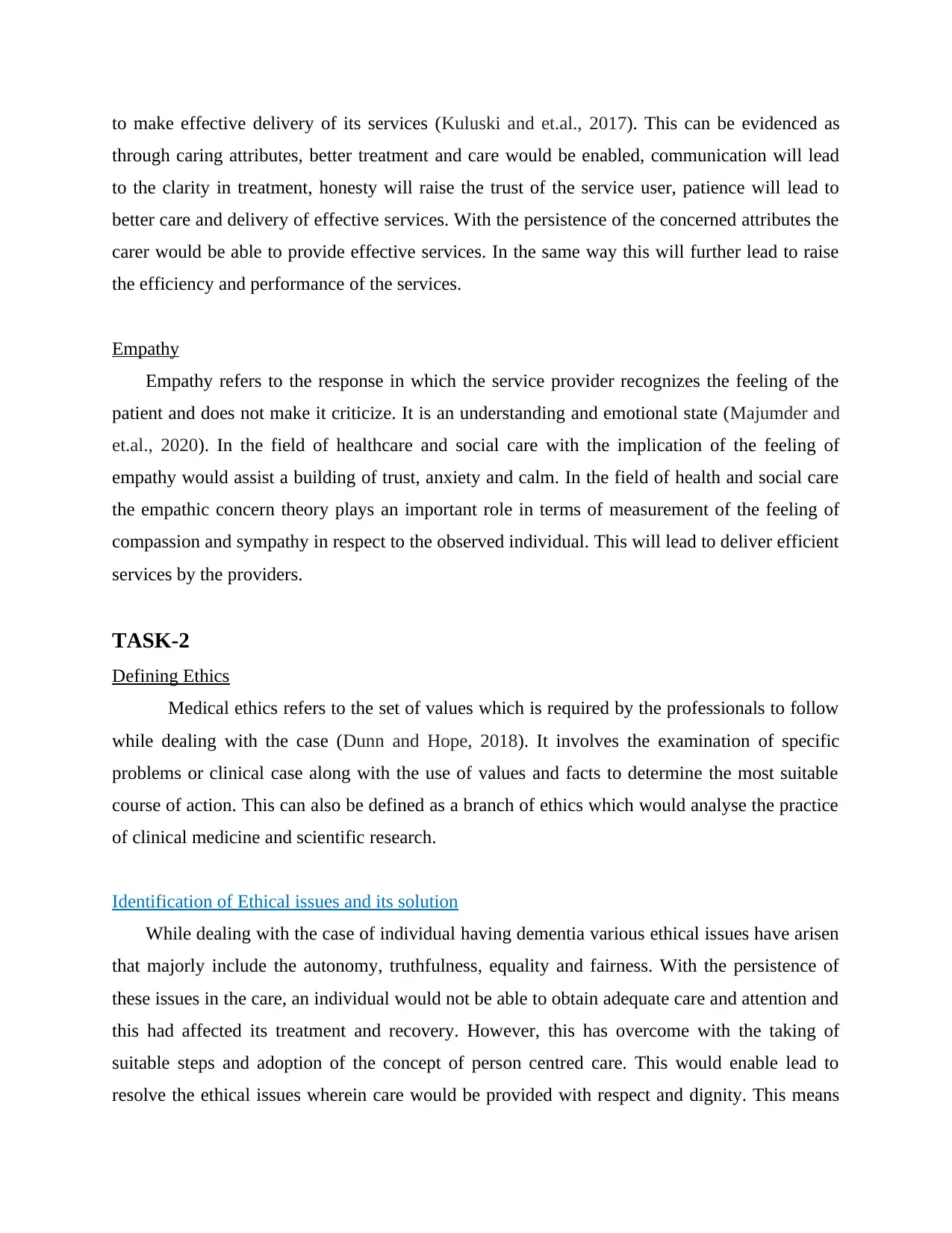
to make effective delivery of its services (Kuluski and et.al., 2017). This can be evidenced as
through caring attributes, better treatment and care would be enabled, communication will lead
to the clarity in treatment, honesty will raise the trust of the service user, patience will lead to
better care and delivery of effective services. With the persistence of the concerned attributes the
carer would be able to provide effective services. In the same way this will further lead to raise
the efficiency and performance of the services.
Empathy
Empathy refers to the response in which the service provider recognizes the feeling of the
patient and does not make it criticize. It is an understanding and emotional state (Majumder and
et.al., 2020). In the field of healthcare and social care with the implication of the feeling of
empathy would assist a building of trust, anxiety and calm. In the field of health and social care
the empathic concern theory plays an important role in terms of measurement of the feeling of
compassion and sympathy in respect to the observed individual. This will lead to deliver efficient
services by the providers.
TASK-2
Defining Ethics
Medical ethics refers to the set of values which is required by the professionals to follow
while dealing with the case (Dunn and Hope, 2018). It involves the examination of specific
problems or clinical case along with the use of values and facts to determine the most suitable
course of action. This can also be defined as a branch of ethics which would analyse the practice
of clinical medicine and scientific research.
Identification of Ethical issues and its solution
While dealing with the case of individual having dementia various ethical issues have arisen
that majorly include the autonomy, truthfulness, equality and fairness. With the persistence of
these issues in the care, an individual would not be able to obtain adequate care and attention and
this had affected its treatment and recovery. However, this has overcome with the taking of
suitable steps and adoption of the concept of person centred care. This would enable lead to
resolve the ethical issues wherein care would be provided with respect and dignity. This means
through caring attributes, better treatment and care would be enabled, communication will lead
to the clarity in treatment, honesty will raise the trust of the service user, patience will lead to
better care and delivery of effective services. With the persistence of the concerned attributes the
carer would be able to provide effective services. In the same way this will further lead to raise
the efficiency and performance of the services.
Empathy
Empathy refers to the response in which the service provider recognizes the feeling of the
patient and does not make it criticize. It is an understanding and emotional state (Majumder and
et.al., 2020). In the field of healthcare and social care with the implication of the feeling of
empathy would assist a building of trust, anxiety and calm. In the field of health and social care
the empathic concern theory plays an important role in terms of measurement of the feeling of
compassion and sympathy in respect to the observed individual. This will lead to deliver efficient
services by the providers.
TASK-2
Defining Ethics
Medical ethics refers to the set of values which is required by the professionals to follow
while dealing with the case (Dunn and Hope, 2018). It involves the examination of specific
problems or clinical case along with the use of values and facts to determine the most suitable
course of action. This can also be defined as a branch of ethics which would analyse the practice
of clinical medicine and scientific research.
Identification of Ethical issues and its solution
While dealing with the case of individual having dementia various ethical issues have arisen
that majorly include the autonomy, truthfulness, equality and fairness. With the persistence of
these issues in the care, an individual would not be able to obtain adequate care and attention and
this had affected its treatment and recovery. However, this has overcome with the taking of
suitable steps and adoption of the concept of person centred care. This would enable lead to
resolve the ethical issues wherein care would be provided with respect and dignity. This means
Paraphrase This Document
Need a fresh take? Get an instant paraphrase of this document with our AI Paraphraser
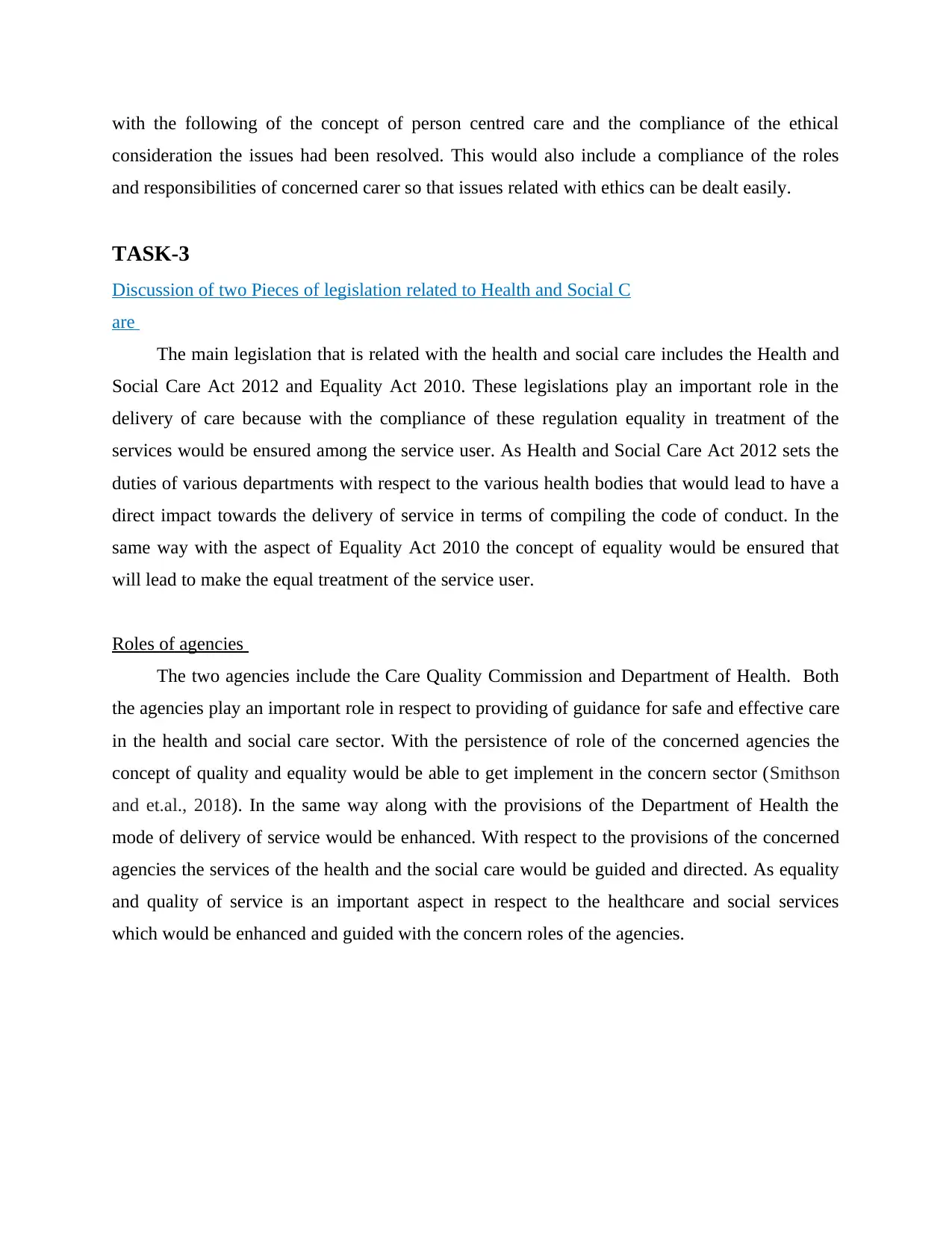
with the following of the concept of person centred care and the compliance of the ethical
consideration the issues had been resolved. This would also include a compliance of the roles
and responsibilities of concerned carer so that issues related with ethics can be dealt easily.
TASK-3
Discussion of two Pieces of legislation related to Health and Social C
are
The main legislation that is related with the health and social care includes the Health and
Social Care Act 2012 and Equality Act 2010. These legislations play an important role in the
delivery of care because with the compliance of these regulation equality in treatment of the
services would be ensured among the service user. As Health and Social Care Act 2012 sets the
duties of various departments with respect to the various health bodies that would lead to have a
direct impact towards the delivery of service in terms of compiling the code of conduct. In the
same way with the aspect of Equality Act 2010 the concept of equality would be ensured that
will lead to make the equal treatment of the service user.
Roles of agencies
The two agencies include the Care Quality Commission and Department of Health. Both
the agencies play an important role in respect to providing of guidance for safe and effective care
in the health and social care sector. With the persistence of role of the concerned agencies the
concept of quality and equality would be able to get implement in the concern sector (Smithson
and et.al., 2018). In the same way along with the provisions of the Department of Health the
mode of delivery of service would be enhanced. With respect to the provisions of the concerned
agencies the services of the health and the social care would be guided and directed. As equality
and quality of service is an important aspect in respect to the healthcare and social services
which would be enhanced and guided with the concern roles of the agencies.
consideration the issues had been resolved. This would also include a compliance of the roles
and responsibilities of concerned carer so that issues related with ethics can be dealt easily.
TASK-3
Discussion of two Pieces of legislation related to Health and Social C
are
The main legislation that is related with the health and social care includes the Health and
Social Care Act 2012 and Equality Act 2010. These legislations play an important role in the
delivery of care because with the compliance of these regulation equality in treatment of the
services would be ensured among the service user. As Health and Social Care Act 2012 sets the
duties of various departments with respect to the various health bodies that would lead to have a
direct impact towards the delivery of service in terms of compiling the code of conduct. In the
same way with the aspect of Equality Act 2010 the concept of equality would be ensured that
will lead to make the equal treatment of the service user.
Roles of agencies
The two agencies include the Care Quality Commission and Department of Health. Both
the agencies play an important role in respect to providing of guidance for safe and effective care
in the health and social care sector. With the persistence of role of the concerned agencies the
concept of quality and equality would be able to get implement in the concern sector (Smithson
and et.al., 2018). In the same way along with the provisions of the Department of Health the
mode of delivery of service would be enhanced. With respect to the provisions of the concerned
agencies the services of the health and the social care would be guided and directed. As equality
and quality of service is an important aspect in respect to the healthcare and social services
which would be enhanced and guided with the concern roles of the agencies.

⊘ This is a preview!⊘
Do you want full access?
Subscribe today to unlock all pages.

Trusted by 1+ million students worldwide
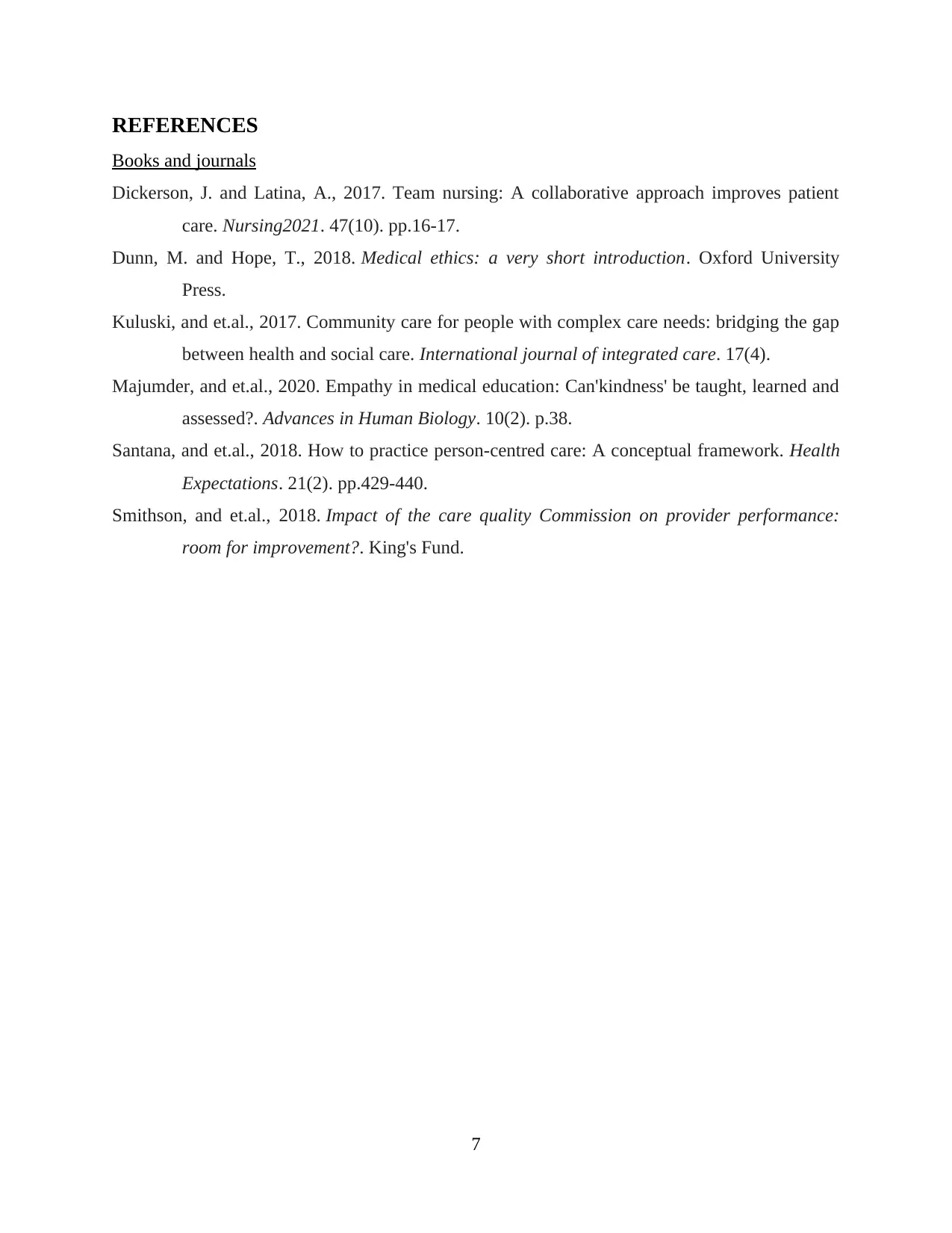
REFERENCES
Books and journals
Dickerson, J. and Latina, A., 2017. Team nursing: A collaborative approach improves patient
care. Nursing2021. 47(10). pp.16-17.
Dunn, M. and Hope, T., 2018. Medical ethics: a very short introduction. Oxford University
Press.
Kuluski, and et.al., 2017. Community care for people with complex care needs: bridging the gap
between health and social care. International journal of integrated care. 17(4).
Majumder, and et.al., 2020. Empathy in medical education: Can'kindness' be taught, learned and
assessed?. Advances in Human Biology. 10(2). p.38.
Santana, and et.al., 2018. How to practice person‐centred care: A conceptual framework. Health
Expectations. 21(2). pp.429-440.
Smithson, and et.al., 2018. Impact of the care quality Commission on provider performance:
room for improvement?. King's Fund.
7
Books and journals
Dickerson, J. and Latina, A., 2017. Team nursing: A collaborative approach improves patient
care. Nursing2021. 47(10). pp.16-17.
Dunn, M. and Hope, T., 2018. Medical ethics: a very short introduction. Oxford University
Press.
Kuluski, and et.al., 2017. Community care for people with complex care needs: bridging the gap
between health and social care. International journal of integrated care. 17(4).
Majumder, and et.al., 2020. Empathy in medical education: Can'kindness' be taught, learned and
assessed?. Advances in Human Biology. 10(2). p.38.
Santana, and et.al., 2018. How to practice person‐centred care: A conceptual framework. Health
Expectations. 21(2). pp.429-440.
Smithson, and et.al., 2018. Impact of the care quality Commission on provider performance:
room for improvement?. King's Fund.
7
1 out of 7
Related Documents
Your All-in-One AI-Powered Toolkit for Academic Success.
+13062052269
info@desklib.com
Available 24*7 on WhatsApp / Email
![[object Object]](/_next/static/media/star-bottom.7253800d.svg)
Unlock your academic potential
Copyright © 2020–2026 A2Z Services. All Rights Reserved. Developed and managed by ZUCOL.





